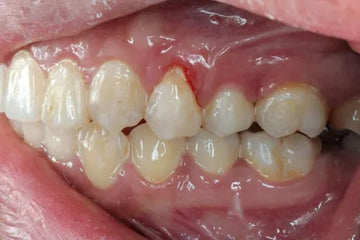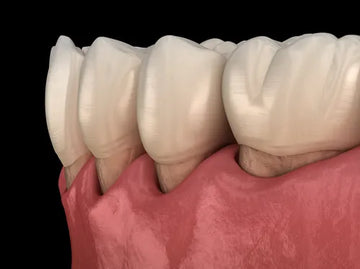The Science Behind Xylitol in Toothpaste
Xylitol is gaining attention in the world of oral care. This natural sugar alcohol is found in many fruits and vegetables. It is a popular ingredient in toothpaste for its dental benefits.
Toothpastes with xylitol are becoming a staple in many households. But what makes xylitol so special? The science behind xylitol in toothpaste is fascinating and worth exploring.
Xylitol helps reduce harmful bacteria in the mouth. It also neutralizes plaque acidity, which is crucial for oral health. These properties make it a powerful tool in preventing cavities.
Many xylitol toothpaste brands market their products as natural or organic. This aligns with the growing trend towards holistic health solutions. But is xylitol safe in toothpaste?
Research shows that xylitol is safe for human use. It is even approved by dental associations worldwide. This makes it a reliable choice for health-conscious individuals.
Understanding the science behind xylitol can help you make informed choices. Whether you're a parent or a dental patient, xylitol toothpaste offers many benefits. Let's dive deeper into this remarkable ingredient.
What Is Xylitol? Origins and Chemistry
Xylitol is a naturally occurring sugar alcohol. You can find it in many fruits and vegetables. It's even present in the fibers of certain plants, like birch trees.
The chemistry of xylitol is quite interesting. It's a five-carbon sugar alcohol, different from regular sugars. This unique structure makes it less likely to contribute to tooth decay.
Here's what you need to know about xylitol:
- Naturally sourced from plants.
- Has a low glycemic index.
- Provides fewer calories than regular sugar.
Xylitol is used as a sugar substitute in various products. It's commonly found in dental products like toothpaste and chewing gum. Its sweet taste is similar to sugar, making it a pleasant additive.
Chemists extract xylitol through a process called hydrogenation of xylose. This method retains its beneficial properties. The safety and effectiveness of xylitol have been tested thoroughly.
Xylitol is gaining popularity in the oral care industry. Its natural origins and chemical benefits make it a preferred choice for many. As consumers look for healthier alternatives, xylitol continues to stand out.
How Xylitol Works in the Mouth: The Scientific Mechanisms
Xylitol plays a unique role in oral health. Unlike sugar, it doesn't feed the bacteria that cause tooth decay. This characteristic makes it effective in fighting cavities.
When xylitol is present in the mouth, it encourages remineralization. This process helps repair damaged tooth enamel. It also neutralizes acids, balancing the mouth's pH levels.
Xylitol disrupts the energy production of harmful bacteria. This action reduces their ability to stick to tooth surfaces. As a result, plaque formation is minimized.
Let's explore the mechanisms of xylitol:
- Inhibits harmful bacteria growth.
- Promotes enamel repair.
- Stabilizes oral pH levels.
Saliva production is essential for healthy teeth. Xylitol stimulates saliva flow, which cleanses the mouth naturally. This increased saliva helps wash away food particles and bacteria.
Scientific studies back xylitol's effectiveness. Many show a significant decrease in cavity incidence with regular use. It's clear that xylitol can be a powerful tool in oral care.
Xylitol isn't only beneficial on its own. When used with proper brushing and flossing, its effects are enhanced. This combined approach leads to optimal oral health outcomes.
The mechanisms of xylitol illustrate the power of nature in healthcare. Its ability to prevent decay while being safe for regular use is unmatched. By understanding these mechanisms, one can appreciate the science behind xylitol's benefits.
Xylitol vs. Sugar and Other Sweeteners in Oral Health
Xylitol stands out among sweeteners for its dental benefits. Unlike sugar, it doesn't promote tooth decay. This makes it a healthier choice for oral care.
Sugar feeds harmful bacteria in the mouth. These bacteria produce acids that erode enamel, leading to cavities. In contrast, xylitol starves these bacteria, reducing their impact.
Let's compare xylitol with other sweeteners:
- Sugar: Increases bacterial growth and acid production.
- Aspartame: Offers no dental benefits.
- Xylitol: Starves bacteria, prevents cavities.
Not all sweeteners affect oral health equally. While some just satisfy taste, xylitol actively protects teeth. Its unique properties offer benefits sugar cannot match.
Incorporating xylitol into daily routines can significantly improve dental health. Its ability to prevent decay while providing sweetness is invaluable. This makes xylitol a smart addition to oral care products.
Xylitol vs. Organic Xylitol
Most toothpastes use xylitol which has been derived from corn. If it is isn't organic you can bet safely that corn is soaked in pesticides. Rubbing pesticide laden corn on your gums, the most absorbent part of your body, is just so crazy. You definitely don't want to do that.
At TranscenDental we use exclusively organic birch derived xylitol. This is the highest quality xylitol you can get. We don't skimp, penny pinch or dilute. Xylitol is our #1 ingredient, more than baking soda, more than hydroxyapatite, by A LOT. That is because we want to pack in the power of this toothpaste. We don't waste space on fillers and texture, we make the texture with our active ingredients. See the toothpaste that has it all. We also use the organic birch xylitol in our mints, these mints cleanse your mouth and reset your oral microbiome, see them here.

The Dental Benefits of Xylitol Toothpaste
Xylitol toothpaste offers multiple oral health benefits. It's not just a sugar substitute but a powerful tool against tooth decay. Its unique properties work actively to protect and enhance dental health.
One key benefit is its role in reducing harmful bacteria. Xylitol targets decay-causing bacteria, effectively lowering their presence in the mouth. This reduction leads to fewer cavities over time.
Another advantage is xylitol's ability to maintain oral pH balance. By neutralizing acid, it creates an environment less conducive to bacterial growth. This balance is crucial for preventing enamel erosion.
For those with dental sensitivity, xylitol toothpaste can offer comfort. It enhances remineralization, strengthening enamel and reducing sensitivity. This can lead to more resilient teeth over time.
Furthermore, xylitol is beneficial for individuals with dry mouth. By stimulating saliva production, it helps maintain moisture in the mouth, promoting oral health. This is especially helpful for those who struggle with dry mouth regularly.
Xylitol toothpaste is particularly recommended for people prone to dental issues. Regular use can lead to noticeable improvements in dental health. Over time, users often experience fewer cavities and fresher breath.
Consider these benefits when choosing oral care products:
- Reduction in harmful bacteria
- Neutralization of mouth acidity
- Strengthening of enamel
The science-backed benefits of xylitol make it a standout ingredient in toothpaste. Its inclusion in oral care routines represents a step toward better dental health.

Cavity Prevention and Plaque Reduction
Xylitol toothpaste excels at cavity prevention. By disrupting bacterial energy production, it significantly lowers the risk of decay. This disruption is key to its effectiveness.
Plaque build-up is a major issue that xylitol addresses. By reducing acid production, xylitol minimizes plaque formation. Less plaque means healthier teeth and gums.
Here's how xylitol helps prevent cavities and reduce plaque:
- Disrupts bacterial growth
- Lowers acidity in the mouth
- Reduces plaque accumulation
Using xylitol toothpaste regularly enhances these protective effects. It creates an inhospitable environment for bacteria. This ongoing support is essential for lasting dental health.
The cavity-preventing power of xylitol is backed by research. Studies show that consistent use can lead to a significant decrease in cavities. The protective barrier it forms can be a game-changer for oral hygiene.

Enamel Remineralization and pH Balance
Enamel remineralization is vital for strong, healthy teeth. Xylitol toothpaste plays a critical role in this process. It aids in repairing and strengthening weakened enamel.
Maintaining pH balance in the mouth is equally important. Acidic environments can lead to enamel erosion. Xylitol toothpaste helps keep acidity in check, safeguarding tooth enamel.
The combination of remineralization and pH balance offers multiple advantages:
- Strengthening of weakened enamel
- Prevention of enamel erosion
- Protection against further decay
Regular use of xylitol toothpaste supports these processes. It aids in natural enamel repair, making teeth more resilient. This ensures long-term dental health and protection.
Incorporating xylitol into your oral care routine can enhance these benefits. The comprehensive protection provided is crucial for maintaining healthy teeth.

Saliva Stimulation and Dry Mouth Relief
Dry mouth can be uncomfortable and damaging. Xylitol toothpaste provides relief by stimulating saliva production. More saliva helps maintain moisture and a healthier oral environment.
Saliva plays a protective role in oral health. It aids in neutralizing acids and washing away food particles. Xylitol supports this natural defense mechanism.
Key benefits of saliva stimulation with xylitol toothpaste include:
- Increased saliva flow
- Moisturizing effects for dry mouth
- Enhanced natural cleaning
Consistent use of xylitol toothpaste can ease dry mouth symptoms. The increased moisture can significantly improve comfort and oral health. This makes xylitol toothpaste an excellent choice for those experiencing dry mouth.

Is Xylitol Safe in Toothpaste? Research and Guidelines
Xylitol's safety in toothpaste has been well-documented. Experts agree it is safe for daily use. This conclusion comes from extensive scientific research and clinical trials.
Dental associations worldwide endorse xylitol in oral care products. They highlight its non-cariogenic properties, meaning it doesn't promote decay. Its approval from these organizations assures consumers of its safety.
Xylitol's safety profile extends beyond dental health. It's considered safe for human consumption. The FDA and other health authorities have deemed it safe, adding to consumer confidence.
Some individuals may question xylitol's use, given that it's a sugar alcohol. However, unlike sugar, xylitol doesn't spike blood sugar levels. Its effects on the body are minimal, especially in the amounts used in toothpaste.
For those considering xylitol toothpaste, here are some safety guidelines to keep in mind:
- Use as directed by dental professionals
- Avoid consumption in excessive amounts
- Keep out of reach of pets, particularly dogs, as it's harmful to them
The science is clear: xylitol is a safe and effective ingredient in toothpaste. Its inclusion enhances oral health without compromising safety.

Xylitol for Children: Safety and Effectiveness
Parents often seek safe toothpaste options for their children. Xylitol meets this need effectively. It's not only safe but also beneficial for young teeth.
Children are prone to tooth decay due to their diet and brushing habits. Xylitol can help reduce cavity-causing bacteria. This makes it a valuable component in children's dental care.
Scientific studies support xylitol's effectiveness in pediatric oral health. It helps prevent cavities and improves overall dental hygiene. Moreover, its sweet taste encourages children to brush regularly.
When choosing toothpaste for children, look for xylitol in the ingredients. This ensures dental benefits are maximized. Here are some additional considerations for parents:
- Choose toothpaste specifically formulated for kids
- Use a pea-sized amount for young children
- Supervise brushing to ensure proper technique
Xylitol offers a safe and effective way to enhance children’s oral care routines.

Xylitol Gum and Toothpaste: Complementary Benefits
Xylitol is a versatile compound used in both gum and toothpaste. They work together to improve oral health. When used in unison, they offer multiple benefits.
Chewing gum with xylitol helps stimulate saliva flow. Saliva is essential for washing away food particles and neutralizing acids. This process complements the action of xylitol toothpaste.
The combination helps reduce harmful bacteria. This dual approach is effective in maintaining oral cleanliness throughout the day. Regular use leads to noticeable improvements in dental health.
Here are some complementary benefits of using both products:
- Enhanced saliva production
- Continuous bacteria reduction
- Prolonged freshness of breath
- Reduced risk of cavities
People find xylitol products easy to incorporate into daily routines. The sweet taste of xylitol makes gum enjoyable, ensuring consistent usage.

The Best Xylitol Toothpaste
TranscenDental makes by far the best xylitol toothpaste. We use organic xylitol so we start with the highest quality. Secondly we use the highest dose in the industry, nobody uses anywhere near as much. It is our main ingredient.
TranscenDental paste doesn't just consist of xylitol, baking soda and some abrasives. Actually we have essentially no abrasives, so it is great for sensitive teeth. What we do have is a crazy robust lineup of heavy hitting nutrients and botanicals to help heal tissues, balance inflammation, regenerate and restore the oral microbiome. Our goal is to turn your mouth into a self cleaning system, just like we did to our own.
We use things like hyaluronic acid, vitamin c, glutathione, vitamin e, magnesium, zinc, trace mineral blends, methylcobolamin, methylfolate, adenine, 5p5, methylated riboflavin, that is a potent lineup of natural endogenous bioactives in one paste!
We combine that with yarrow, comfrey, ginseng, gotu kola, cinnamon, ginger, clove, birch, miswak, sage, rosemary, fennel. A botanical smorgasbord like never seen before.
What Toothpaste Contains Xylitol? Popular Brands and Products
Many brands use xylitol. You will notice it is never organic so it always includes pesticides. You will also notice it in the middle of the ingredients list. These tiny amounts may or may not be enough to have the desired effect. You are already using a small amount of toothpaste so if the xylitol is a small fraction of that then you are not getting much. Check your ingredients people.

Xylitol Pro Clinic Toothpaste and Professional Options
For a more clinical approach, Xylitol Pro Clinic toothpaste is a standout. Designed for professional use, it focuses on delivering optimal results. These products are often found in dental practices and recommended by clinicians.
Xylitol Pro Clinic offers enhanced cavity prevention. The higher concentration of xylitol plays a pivotal role. This ensures maximum bacterial inhibition and oral health support.
Other professional-grade options include:
- Elevated xylitol content
- Formulations tailored for dental clinics
- Endorsed by dental professionals
The thing is that most of even these clinical types of products contain many toxic ingredients. They all make the huge miscalculation of their couple good ingredients being so good that nobody should take into account all the toxic garbage making the texture and flavor of the paste. This is classic "excipient logic" in pharma formulation. You just bury all the additional toxic filler and hide it at the bottom while showing your active ingredients in a separate panel. How convenient.

How to Choose the Best Xylitol Toothpaste for Your Needs
Selecting the perfect xylitol toothpaste involves a few simple steps. First, consider your specific oral health needs. Different toothpastes cater to various concerns like sensitivity, whitening, or natural ingredients.
Next, review the ingredient list. Ensure xylitol is among the top listed components. Higher xylitol content often means better efficacy in cavity prevention.
When choosing, think about your personal preferences for flavor and texture. Some brands offer minty fresh options, while others focus on fruity flavors. This is especially crucial if multiple users are in the household.
Here's a quick checklist for choosing the best xylitol toothpaste:
- Identify your oral health focus
- Check the xylitol concentration
- Consider flavor and texture preferences
Make it simple and just choose TranscenDental the one paste that has it all.

Finally, think about any additional features you desire. This could include fluoride-free, organic, or eco-friendly packaging. These choices align with broader lifestyle preferences and contribute to a comprehensive oral care routine.
How to Use Xylitol Toothpaste for Maximum Benefit
To fully benefit from xylitol toothpaste, use it correctly and consistently. Start by brushing your teeth twice daily, for two minutes each time. This ensures thorough cleaning and maximum xylitol exposure.
Apply a pea-sized amount of toothpaste to your toothbrush. Make sure to cover all teeth surfaces evenly. Gentle circular motions are recommended, as they help distribute the toothpaste and maintain gum health.
For optimal results, follow these simple steps:
- Brush twice daily
- Use circular brushing motions
- Cover all surfaces

Rinse your mouth after brushing, but avoid drinking or eating immediately. This gives xylitol a chance to work longer. Consistent use along with regular dental checkups will improve oral health significantly over time.
Potential Side Effects and Considerations
While xylitol is safe, there are some considerations to keep in mind. In rare cases, it might cause minor gastrointestinal discomfort if consumed in large amounts. This is something to watch out for, especially for those new to using xylitol products.

Always check toothpaste labels for concentration and additional ingredients. Some may contain artificial sweeteners that you're sensitive to. It's important to know what's in your dental care products.
Here are a few tips:
- Start with a small amount
- Monitor for any discomfort
- Consult with a dentist if unsure
Finally, remember that xylitol is toxic to dogs. Keep toothpaste out of their reach to ensure their safety at home.
Frequently Asked Questions about Xylitol Toothpaste
Is xylitol safe to use in toothpaste?
Yes, xylitol is safe for most people. Dental associations worldwide approve its use due to its oral health benefits.
Can children use xylitol toothpaste?
Children can safely use xylitol toothpaste. It is a great alternative to fluoride for kids who are prone to swallowing toothpaste.
How does xylitol help prevent cavities?
Xylitol reduces harmful bacteria in the mouth. This helps lower the risk of cavities and promotes a healthier oral environment.
Does xylitol toothpaste improve breath?
Yes, xylitol toothpaste can help freshen breath. Its ability to reduce bacteria can lead to fresher breath over time.
Can xylitol cause any side effects?
In rare instances, high amounts can cause digestive issues like gas. However, it's generally well-tolerated when used in toothpaste.
Is xylitol found in other oral care products?
Absolutely, xylitol is common in gum, mouthwash, and mints. These products complement xylitol toothpaste for overall oral health.
What should I consider when choosing xylitol toothpaste?
Look for high xylitol content and check for other natural ingredients. Consider personal preferences like flavor or organic labels.
Where can I find xylitol toothpaste?
Many grocery and health stores offer xylitol toothpaste brands. Online stores also carry a wide selection to choose from.
Conclusion: The Future of Xylitol in Oral Care
Xylitol's role in oral care is set to expand. With increasing consumer awareness, the demand for natural and effective dental solutions is rising. Xylitol is well-positioned to meet these needs.
The science supporting xylitol's benefits continues to grow. Researchers are exploring new applications that could enhance its effectiveness even further. As this research progresses, we may see innovations that incorporate xylitol in unique ways.
Overall, xylitol toothpaste represents a shift toward holistic oral care. It combines scientific rigor with natural ingredients, appealing to health-conscious individuals. As trends evolve, xylitol will likely play an even more significant role in supporting dental health.








